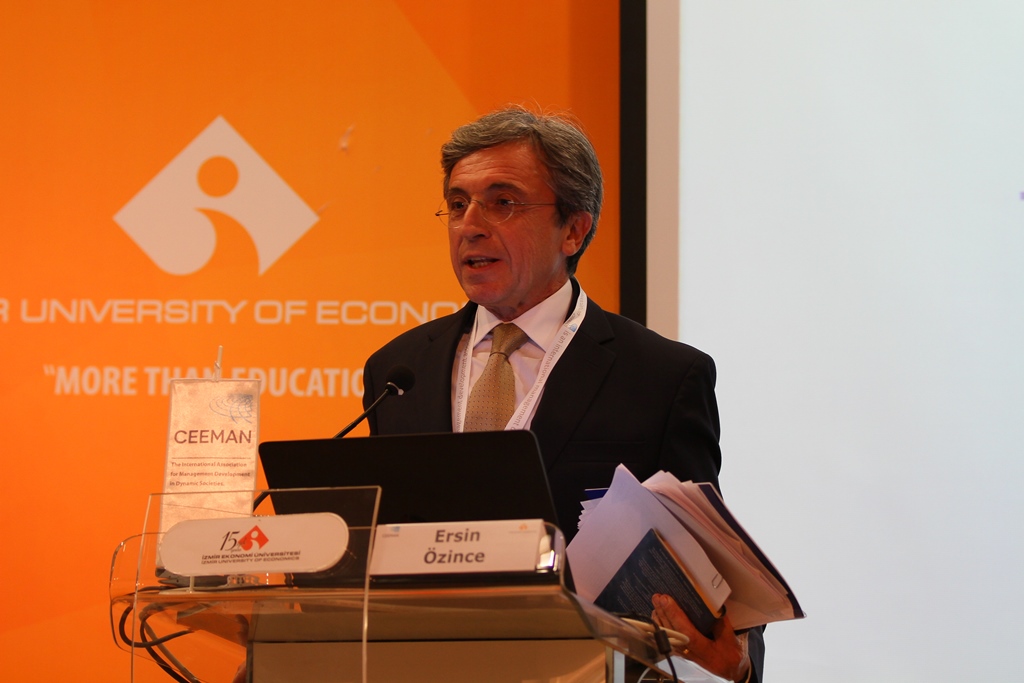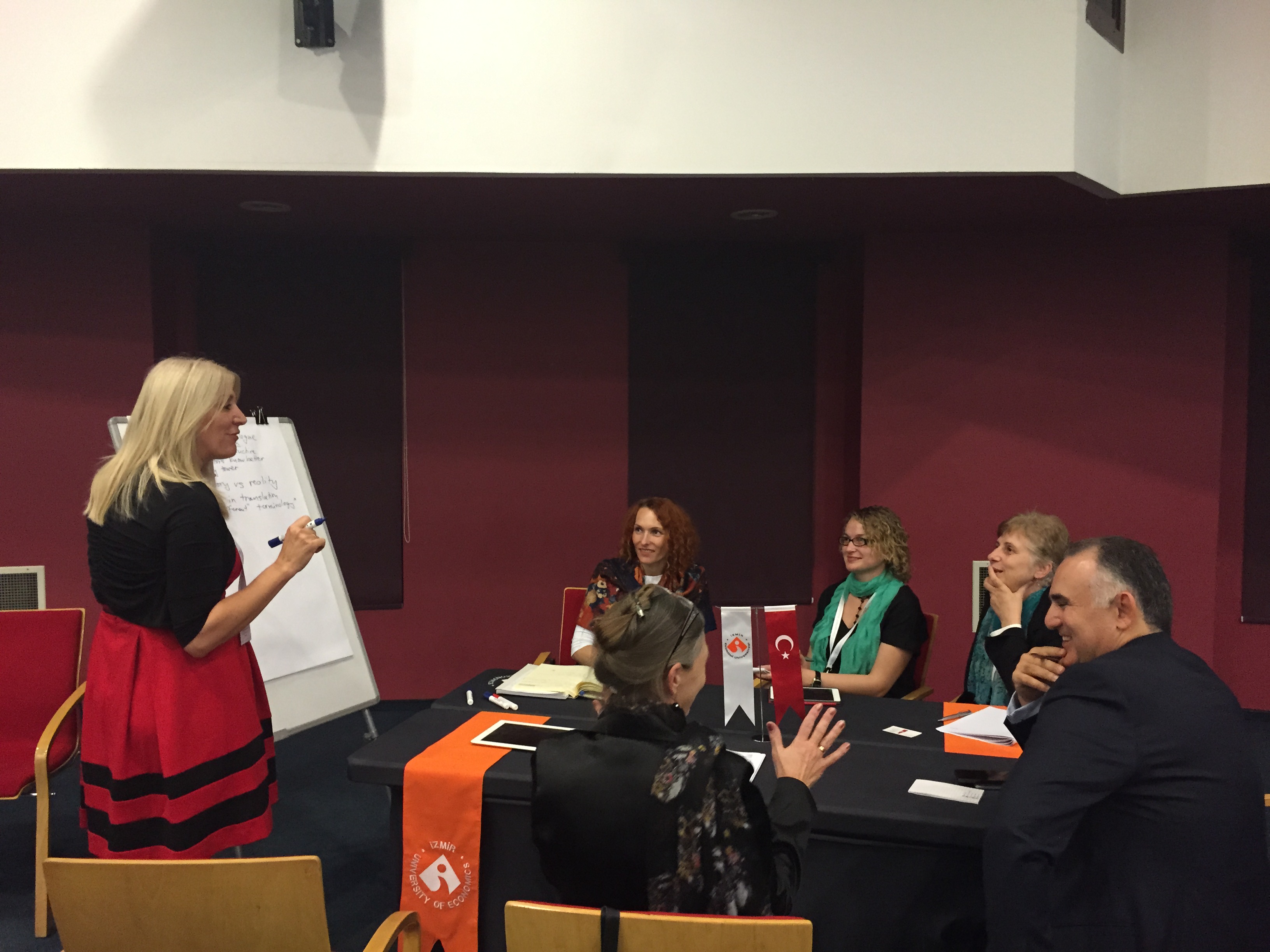The event, attended by about 50 participants from 10 countries, discussed the current and future business needs in South-East Europe and executive education responses.
The Forum opened with a keynote by Ersin Özince, President of the Board of Directors of İş Bankası, Turkey. He stressed the importance of relying on highly professional local managers for companies operating and investing in CEE markets, and commended the significant increase in quality of executive education offerings in the region. He noted that current turmoil in the financial system is very serious and is “sucking out” entrepreneurial potential from CEE region. Globalization of financial systems brings advantages and risks; more pragmatic solutions and careful government planning need to be implemented to make financial sector stronger and financial resources more available for higher economic independence of countries. Financial inclusiveness through answering the financial needs of different income groups is becoming increasingly important, and labor issues have to be urgently addressed.

Another keynote speaker was Ali Pandir, Chairman and Managing Director of Erdemir Group, Turkey. During his international career, he lived and worked in environments undergoing significant changes and turbulent times (Turkey, China, South-East Asia, etc). He stressed that for managers and business school graduates living and working in the current VUCA (Volatile, Uncertain, Complex and Ambiguous) world, it is especially important to see and read a big picture and understand how the world is going (both in the past and in the future). Left part of the brain should be encouraged more, relying not only on the rational and pragmatic thinking but also on emotional intelligence, creativity, and with that innovations, while leaders should inspire in order to drive change.
The business panel led by Mazhar Izmiroglu, Honorary Consul of Slovenia in Turkey provided multiple highlights related to current and future business needs. Neslihan Cakit, Director of Organizational Development and Talent Management of Erdemir Group, mentioned that according to Global Entrepreneurship Monitor, Turkey needs one million entrepreneurs in the next few years to overcome current economic difficulties, which is a great opportunity for business schools and universities. To train both entrepreneurs and intrapreneurs (entrepreneurs within corporations), innovative and collaborative education techniques have proved to be more successful. Anastasia Sideri, Communications Director for CSE of the Coca-Cola company, Greece, stressed the importance of ethical mindset in business, and that business schools should better integrate ethical mentality and embed the universal values of honesty, respect, fairness, responsibility and compassion in their programs. “Being leaders in business and education is a privilege and responsibility”, she noted. Boštjan Skalar, former Director of Slovenian Public Agency for Promotion of Investment, Internationalization, Entrepreneurship and Tourism (SPIRIT) and former Consul for Economic Affairs in Turkey, Slovenia, presented some of the challenges and opportunities of working with the millennials, including some of the differences between more developed and less developed countries. Müjgan Suver, Executive and the Founder of EU and Human Rights Platform, Marmara Foundation, Turkey spoke about the importance of greater inclusiveness of women talents in business life.

The educators’ panel, moderated by Serdar Özkan, Vice Director of Graduate School of Business, İzmir University of Economics, discussed several interesting examples of successful executive education practices. Quite a few of business schools already address the business needs for more “soft” skills through their programs. Danica Purg, President of IEDC-Bled School of Management showed a movie about how various forms of arts are integrated into MBA programs and how it helps participants to open up new perspectives on challenges and issues they face in their companies, become more perceptive, and develop leadership and people skills. Sergei Filonovich, Dean of Graduate Management School, National Research University - Higher School of Economics, Russia built on that further and explained how intuition and emotional intelligence can be developed with the help of art, music, paintings, and movies. He also indicated the increasing importance of life-long learning and the trend towards a system of executive education offerings addressing different needs at different stages of one’s career (rather than stand-alone programs). In top leadership positions, he said, the role of individual executive coaching is also extremely important. Burcin Buzkaya, Associate Dean of Sabanci University, Turkey shared some insights into a new project on big data that his university is starting. The objective is to offer university’s research capabilities to analyze vast amounts of data that big corporations gather through their work, in order to produce new insights and relevant outputs for more effective data-driven decisions. Kostas Axarloglou, Associate Dean of ALBA Graduate Business School at The American College of Greece showed how his school has completely revised its executive education programs due to the financial and economic crisis in the country. He highlighted the role of business schools as hot spots for life-long learning and the crucial importance of close cooperation with business for increasing employability and overcoming external obstacles and circumstances, working together for the benefit of the whole society. Recep Pekdemir, Dean of Istanbul University School of Business shared insights from the 80 years of his university’s development, which started with the first executive education programs already in the 1950s.
The Forum concluded with highly interactive World café discussions where participants had an opportunity to brainstorm on how cooperation between companies and business schools could be further improved to achieve stronger competitive advantages and a win-win situation for both parties. There are already many successful examples of new ways of learning, new types of programs, and cooperation between companies and business schools. However, in the words of the Forum moderator Gazmend Haxhia, President of A.S.G., Albania “the future is not waiting for deans and directors to figure it out”, and business schools should listen better and act faster to answer the changing needs of businesses and society.
Speakers’ presentations are available at www.ceeman.org/exed.